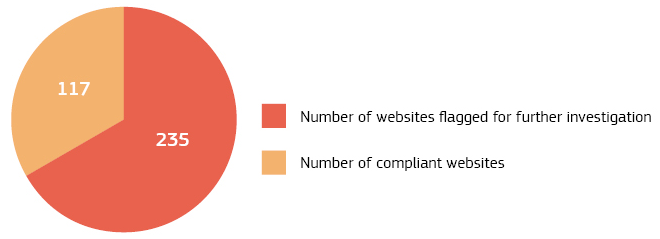9 Apr 2017
Misleading travel booking websites a growing problem in Europe
Brussels, 7 April 2017, European Commission Press release — The European Commission and EU consumer protection authorities launched a coordinated screening of 352 price comparison and travel booking websites across the EU in October 2016. They found that prices were not reliable on 235 websites, two thirds of the sites checked. For example, additional price elements were added at a late stage of the booking process without clearly informing the consumer or promotional prices did not correspond to any available service.
Authorities have asked the websites concerned to bring their practices in line with EU consumer legislation, which requires them to be fully transparent about prices, and present their offers in a clear way, at an early stage of the booking process.
Věra Jourová, Commissioner for Justice, Consumers and Gender Equality, said: “The Internet provides consumers with plenty of information to prepare, compare and book their holidays. However, if the reviews on comparison websites are biased or prices are not transparent, these websites are misleading consumers. The companies concerned need to respect the European consumer rules, just like a travel agent would. Consumer authorities will now require the websites to solve these issues. Consumers deserve the same protection online as offline.”
Key findings
- What you believe you’ll pay, is it what you will actually pay? In one third of the cases, the price first shown is not the same as the final price.
- Is it an offer or is it just bait? In one fifth of the cases, promotional offers were not really available.
- Puzzled mind or puzzled price? In almost one third of the cases the total price or the way it was calculated was not clear.
- Last cheap room in the hotel or simply last promoted room on that website? In one in four cases, websites did not specify that statements about scarcity (e.g. “only 2 left”, “only available today”) applied strictly to their own website.
Next steps
The 235 websites with irregularities will have to correct the irregularities. Consumer Protection Cooperation authorities will ensure they comply by activating their national enforcement procedures.
Background
An EU-wide screening of websites (“sweep”) is a set of checks which are carried out simultaneously by consumer protection authorities in different countries. These checks reveal whether EU consumer protection laws are respected. If the checks find a breach of EU consumer law, then the consumer protection authorities contact the companies involved and ask them to make corrections. Previous “Sweep” actions have focused so far on: airlines (2007), mobile content (2008), electronic goods (2009), online tickets (2010), consumer credit (2011), digital contents (2012), travel services (2013), guarantees on electronic goods (2014) and consumer rights directive (2015).”
Every year the Commission coordinates the screening of websites for a particular sector, with the help of the Consumer Protection Cooperation (CPC) network which brings together the consumer authorities of 28 countries (26 EU countries, Norway and Iceland). The authorities are responsible for enforcing EU consumer protection laws in the EU.
The results of the 2016 screening of travel comparison and booking websites
The CPC authorities of 28 countries (26 EU countries, Norway and Iceland) checked a total 352 websites comparing offers and prices, mainly in the travel sector.
Out of the total number of websites, 23.6% compared accommodation prices, 21.3% compared tickets prices (air, boat, train, bus), 5.1% compared car rental prices, whilst
44.6% offered a combined comparison of products and services (tickets, accommodation, holiday packages, etc.).
The screening revealed a series of irregularities in online comparison tools. The main irregularities related to the price and the way it was calculated and presented:
- in 32.1% of cases, the price on the page of the comparison list was not the same as the price ultimately displayed in the booking page;
- on 30.1% of the websites, the total price (inclusive of taxes) or the way this was calculated was not clear;
- 20.7% of the websites presented special prices, which were not then available as advertised through the actual booking page;
- 25.9% of the websites gave the impression that certain offers were scarce (e.g. “only 2 left”, “only available today”) without specifying that this scarcity applied strictly to their own website.
Other irregularities identified by the CPC authorities were related to:
- the identity of the provider of the comparison tool: 22.7% only gave limited information (e.g. name, address of establishment), while 4% did not provide any information at all;
- the user review process: 21.3% of the websites presented consumer reviews in an unclear or un-transparent way (and/or included elements that could question their truthfulness);
- the coverage of the comparison: 10.5% of the websites did not provide material information that was important for the comparison.
The least problematic issue was the presentation of advertising and marketing. Only 2.8% of the websites contained this type of irregularity.
Number of websites checked during the sweep and flagged for further investigation

Number of websites checked per type of Comparison Tool

Number of websites checked per type of service/product compared

